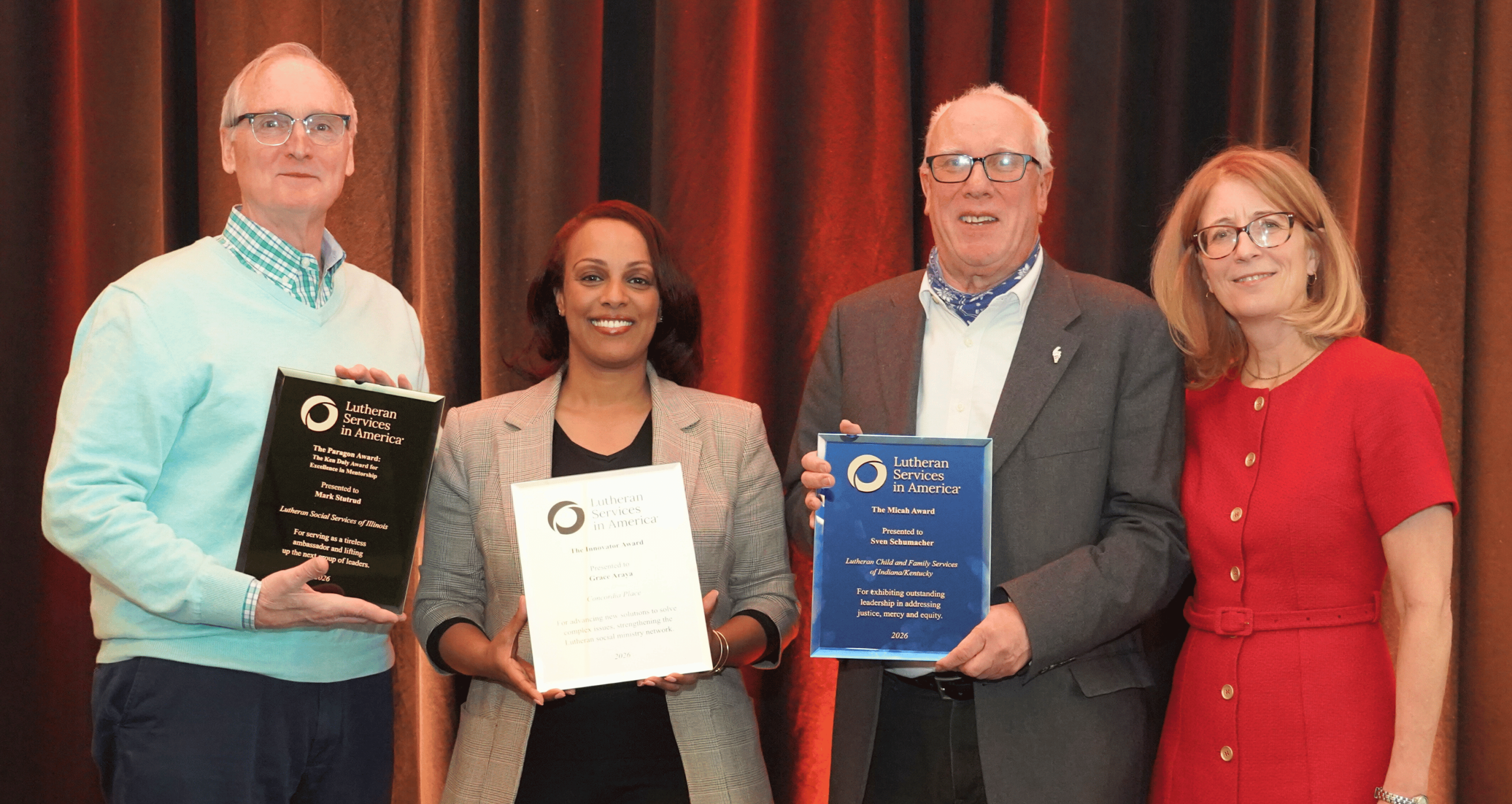
Lutheran Services in America Announces 2026 Leadership Award Winners
February 9, 2026

February 9, 2026

January 29, 2026
2026 is an important year for Lutheran Services in America. In a rapidly shifting environment marked by changes in Medicaid financing, housing instability, and workforce pressures (to name just a few), our network is moving beyond adaptation toward intentional system leadership. We are stepping forward to position and advance our network of Lutheran social ministries to catalyze collaboration and innovation. Here are some highlights.
Growing our Collective Capacity to Lead
Leadership is at the heart of our mission. This year, we’re doubling down on efforts to support CEOs and their leadership teams more intentionally and consistently starting with The Summit: Bold Leadership and the Art of Resilience. The Summit convenes leaders across philanthropy, policy, housing, and technology, creating space for collaboration and action.
Peer networks like the Lutheran Information Technology Network (LITN) and Lutheran Financial Managers Association (LFMA) amplify this work, offering trusted spaces for learning and innovation throughout the year. For example, through our AI Advisory Committee, community of practice, and new webinar series with LITN and LFMA, we’re creating a trusted space for CEOs to set direction, provide oversight, and operationalize AI in alignment with our shared mission and values.
Catalyzing Innovation and Collaboration
We’re investing in strategies that create new pathways for growth. Through the Housing Solutions Collaborative, 27 members that steward $1 billion in annual revenue are shaping solutions at the intersection of health and housing.
The Results Innovation Lab, which celebrates its 10th anniversary in February, is evolving into an integrated platform that elevates equity, housing, workforce, and policy strategies for long-term scale. At the same time, with new partnerships like the SCAN Foundation and RRF, we’re preparing for demographic shifts by scaling and replicating our Rural Aging Action Networks.
Amplifying our United, Faith-based Voice
Policy and advocacy remain top priorities. For example, our Medicaid strategy with leadership from our Policy & Advocacy Committee, works in two ways: 1) Defending against challenges to eligibility and enrollment as H.R. 1 continues to be implemented, while at the same time, informing the new Rural Health Transformation Fund; and 2) Strengthening partnerships between CBOs and Medicaid managed care organizations, including through value-based payment approaches to improve outcomes and control costs.
Looking Ahead
Leadership is not about certainty; it’s about presence. In 2026, our network is showing up with clarity and resilience by aligning mission with strategy, grounding policy with practice, and positioning our network to lead rather than follow. This year, even with the many ongoing challenges and disruptions, we are committed to persevering with bold leadership and resilience.
Alesia Frerichs is the President & CEO of Lutheran Services in America.

December 22, 2025
Across Lutheran Services in America, we often talk about the need to bridge policy and practice. The Results Innovation Lab (RIL), in partnership with the Strengthening Families Initiative (SFI), is doing exactly that by turning national policy priorities into real-world learning through local demonstration sites.
At a time when Medicaid policy, child welfare systems, and community-based organizations are all under pressure, these sites are helping us answer a critical question: What does prevention actually look like on the ground—and what does it take to make it work?
Our demonstration sites are showing that prevention is not a single program or service, but a way of working across systems. It shows up in addressing basic needs early, coordinating care more effectively, and reducing the likelihood of crisis before families reach child welfare or emergency systems. Making prevention work requires strong cross-sector collaboration, clear shared populations, and the ability to test small changes, learn quickly, and adapt.
RIL’s focus on outcomes, equity, and leadership development is now directly shaping how we design and support local demonstration sites alongside health care. Rather than starting with abstract policy ideas or top-down models, we are using small, practical tests of change to learn what collaboration actually looks like on the ground, under real-world conditions.
This approach allows us to:
This matters in the current policy environment. The White House’s 2025 Executive Order emphasizes family stability, timeliness, upstream investment, and cross-system coordination. Through RIL and SFI, Lutheran Services in America is effectively operating a living lab for what that policy vision looks like in practice.
In Pennsylvania and Virginia, the demonstration sites are surfacing several consistent lessons with clear policy implications.
Identifying shared populations is harder than expected—but essential.
Even when organizations serve the same families, health plans, schools, and child welfare systems often define populations differently. The work of aligning around a shared group of children or families takes time, trust, and data—but it is foundational to any meaningful partnership.
Small tests of change are the right scale for this moment.
Rather than launching large pilots, sites are using Plan-Do-Study-Act (PDSA) cycles to test ideas quickly. These small tests help partners stay engaged, surface barriers early, reduce risk, and generate evidence that can inform future investment. This is exactly the kind of learning federal and state leaders look for when identifying promising prevention approaches.
Basic needs are the gateway to deeper engagement.
Across sites, food access, transportation, hygiene supplies, and mental health supports consistently emerge as high-impact entry points. Addressing these needs improves appointment attendance, engagement in services, and trust with families—outcomes that matter to both child welfare and Medicaid systems.
Workforce capacity matters as much as program design.
Burnout and turnover can undermine even the strongest ideas. RIL’s emphasis on resilience, listening, and curiosity is helping organizations adapt while protecting staff capacity, an often overlooked but critical component of prevention.
Medicaid has become one of the largest funders of prevention. Families interact with health systems far more frequently than they do with formal child welfare systems, making Medicaid a powerful lever for upstream support.
Our demonstration work with UnitedHealthcare highlights several truths:
Lutheran Services in America members are uniquely positioned to bridge these gaps by stabilizing families, improving care coordination, reducing avoidable involvement, and delivering trusted, community-rooted support. In many ways, this is exactly what policymakers are asking systems to do. The demonstration sites are helping show the “how.”
The learning from these sites is already shaping how Lutheran Services in America will strengthen practice across the network. Key areas of focus include:
Together, this work helps Lutheran Services in America members meet the current policy moment while staying rooted in mission. By grounding policy aspirations in practical learning, the demonstration sites are not just testing ideas, they are helping build a roadmap for prevention that can scale.
Renada Johnson is Senior Director of Children, Youth & Family Initiatives at Lutheran Services in America.

December 11, 2025
On December 8, the Centers for Medicare and Medicaid Services (CMS) issued initial, new guidance to states to inform implementation of the new Medicaid community engagement provisions (aka: work reporting requirements) included in H.R. 1. The new law includes multiple sweeping changes to the Medicaid program, with more guidance expected to follow. In issuing this initial guidance, CMS officials outlined four principles guiding policy development:
CMS reiterates the statutory deadline of January 1, 2027, for states to implement the new community engagement requirements, while outlining a process for the Secretary to grant temporary compliance exemptions ending on December 31, 2028 or before to states experiencing hardships but demonstrating good faith efforts to comply. The agency will also issue grants to help states establish new or updated systems to comply with the new requirements.
While the guidance focuses primarily on restating in plain language the requirements from H.R. 1 across key areas of focus, as enumerated below, there are a few new pieces of operational direction as noted. For example, CMS has offered new interpretations related to compliance verification, potential sources of “reliable information” for those verifications, and the role of managed care organizations (MCOs). Deeper analysis is also available from our partners in the Modern Medicaid Alliance.
CMS is expected to issue additional guidance, particularly with more detailed instructions for state operationalization. H.R. 1 requires CMS to issue an interim final rule by June 1, 2026, though it is not yet clear whether outstanding questions will be addressed through that final rulemaking or through further subregulatory guidance beforehand. We will share more information as it becomes available.
Sarah Dobson is Senior Director of Advocacy and Public Policy at Lutheran Services in America.

November 20, 2025